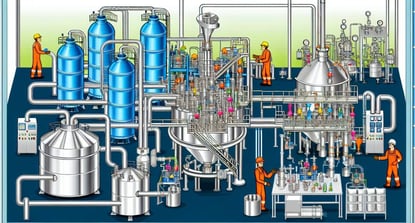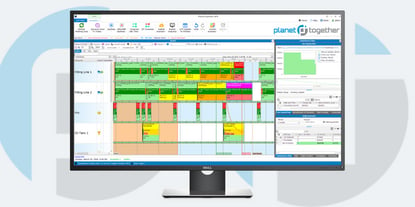Enhancing Lean Manufacturing with Seamless Integration and Continuous Improvement Initiatives
The pursuit of efficiency and excellence in chemical manufacturing is essential. As a Purchasing Manager, you're at the helm of ensuring seamless operations and optimizing resources to drive growth. Amidst the complexities of the industry, Lean manufacturing principles emerge as a beacon of efficiency, and continuous improvement initiatives stand as pillars of progress.
In this blog, we'll look into the integration of Lean methodologies with cutting-edge technologies like PlanetTogether and leading ERP, SCM, and MES systems like SAP, Oracle, Microsoft, Kinaxis, and Aveva. Let's embark on a journey to unlock the full potential of your manufacturing operations.

Lean Manufacturing
At its core, Lean manufacturing is a philosophy focused on eliminating waste and maximizing value to enhance efficiency and productivity. Originating from the Toyota Production System, Lean principles emphasize continuous improvement, respect for people, and the relentless pursuit of perfection. By streamlining processes, reducing lead times, and optimizing resources, Lean methodologies enable organizations to deliver high-quality products at competitive costs.

Key Principles of Lean Manufacturing
Value Stream Mapping: A crucial step in Lean implementation involves mapping the entire value stream to identify areas of waste and inefficiency. By visualizing the flow of materials and information, organizations can pinpoint bottlenecks and streamline processes to optimize value delivery.
Just-in-Time (JIT) Production: JIT manufacturing aims to produce goods only when needed, minimizing inventory levels and reducing storage costs. By synchronizing production with customer demand, organizations can enhance responsiveness and eliminate excess inventory, thereby freeing up capital and resources.
Kaizen: Kaizen, or continuous improvement, lies at the heart of Lean manufacturing. Encouraging a culture of continuous learning and innovation, Kaizen empowers employees at all levels to identify and implement incremental improvements in processes, driving efficiency and enhancing competitiveness.
5S Methodology: The 5S methodology—Sort, Set in order, Shine, Standardize, and Sustain—provides a systematic approach to workplace organization and cleanliness. By establishing standardized procedures and visual controls, organizations can create a conducive environment for efficient operations and employee engagement.

Integration of PlanetTogether and ERP/SCM/MES Systems
To fully leverage the benefits of Lean manufacturing, seamless integration between advanced planning and scheduling tools like PlanetTogether and ERP, SCM, and MES systems is essential. Let's explore how integration with leading platforms such as SAP, Oracle, Microsoft, Kinaxis, and Aveva can drive operational excellence:
Real-Time Data Exchange: Integration enables the exchange of real-time data between planning and execution systems, providing visibility into production schedules, inventory levels, and demand forecasts. By synchronizing information across the supply chain, organizations can make informed decisions and respond swiftly to changing market dynamics.
Optimized Production Planning: By integrating PlanetTogether with ERP systems like SAP and Oracle, organizations can enhance production planning capabilities, aligning production schedules with customer demand and resource availability. Automated data exchange facilitates accurate demand forecasting, inventory management, and capacity planning, enabling organizations to optimize production schedules and minimize lead times.
Efficient Resource Utilization: Integration with MES systems allows organizations to monitor and control shop floor operations in real time, optimizing resource utilization and minimizing downtime. By synchronizing production schedules with machine availability and operator skill levels, organizations can maximize productivity and minimize production costs.
Streamlined Supply Chain Management: Integration with SCM systems enables organizations to streamline supply chain operations, from procurement to distribution. By synchronizing production schedules with supplier lead times and transportation schedules, organizations can minimize stockouts, reduce inventory holding costs, and enhance supply chain resilience.

Continuous Improvement Initiatives
In the pursuit of operational excellence, continuous improvement initiatives play a pivotal role in driving organizational growth and competitiveness. Here's how you can foster a culture of continuous improvement within your manufacturing facility:
Employee Empowerment: Empower employees at all levels to actively participate in continuous improvement initiatives. Encourage idea generation, provide training and resources, and recognize and reward employees for their contributions to process optimization.
Cross-Functional Collaboration: Foster collaboration between departments to identify and address cross-functional challenges. Establish multidisciplinary improvement teams comprising representatives from production, procurement, engineering, and quality assurance to tackle complex issues and drive sustainable improvements.
Data-Driven Decision Making: Leverage data analytics and performance metrics to identify improvement opportunities and track progress over time. Implement key performance indicators (KPIs) aligned with strategic objectives and use data visualization tools to communicate performance trends and areas for improvement.
Iterative Learning and Adaptation: Embrace a mindset of iterative learning and adaptation, where failures are viewed as learning opportunities and feedback loops drive continuous refinement. Encourage experimentation, iterate on improvement initiatives, and adapt processes based on lessons learned to drive ongoing improvement.
In the competitive landscape of chemical manufacturing, the adoption of Lean manufacturing principles and continuous improvement initiatives is critical to driving operational excellence and sustaining long-term growth. By leveraging advanced planning and scheduling tools like PlanetTogether and integrating them with leading ERP, SCM, and MES systems, organizations can streamline operations, optimize resource utilization, and enhance supply chain agility.
As a Purchasing Manager, your role in fostering a culture of continuous improvement and driving organizational change is instrumental in unlocking the full potential of your manufacturing operations.
Embrace the journey towards excellence, and let Lean principles guide you towards a future of sustainable success. Are you ready to take your manufacturing operations to the next level? Contact us today to learn more about how PlanetTogether can help you achieve your goals and drive success in your industry.



